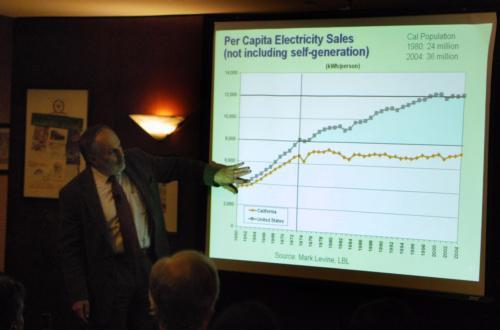
News
Summers Will Not Finish Semester of Teaching as Harvard Investigates Epstein Ties

News
Harvard College Students Report Favoring Divestment from Israel in HUA Survey

News
‘He Should Resign’: Harvard Undergrads Take Hard Line Against Summers Over Epstein Scandal

News
Harvard To Launch New Investigation Into Epstein’s Ties to Summers, Other University Affiliates

News
Harvard Students To Vote on Divestment From Israel in Inaugural HUA Election Survey
Ec. Prof Leads Climate Change Talk
Nobel Prize winner says consumption does not drive global warming

Is economics—the “dismal science”—to be blamed for climate change?
According to economics professor Charles D. Kolstad from the University of California at Santa Barbara the answer is no.
“The economy as it currently functions does need changing, but that’s not the same as saying economists need to change their tune,” Kolstad said.
Kolstad, a lead author for the Intergovernmental Panel on Climate Change and a co-recipient of the 2007 Nobel Peace Prize, discussed climate change yesterday afternoon at the Kennedy School of Government using a colorful PowerPoint presentation complete with graphs and charts.
Kolstad began by identifying several common criticisms of economics in relation to climate change, including consumption, an economist’s social values, and anti-environmental cost-benefit analysis.
“The climate debate tends to focus on putting in environmental energy-efficient light bulbs or driving Priuses,” he said. “The fact is that most of our greenhouse gas emissions come from all the things we consume.”
But condemning an economist’s advocacy of consumption and growth as the cause of climate change problems is an oversimplification of the issue, according to Kolstad.
“Growth in and of itself is fine—in fact, it’s good for the people who are not well off,” Kolstad said. “But it’s the nature of growth, the composition of consumption, that we want to be concerned about.”
In recent years, there has been a general “command and control” approach to regulating the problem. For example, the cap-and-trade system, which consists of an overall cap on emissions and the buying and selling of emission permits, has been very successful, especially in the sulfur allowance market, he said.
Kolstad expects to see “major progress” in carbon emissions in the U.S. over the next two years.
The event, which attracted approximately 100 faculty members, graduate students, and undergraduates, was organized by the Harvard Environmental Economics Program (HEEP). Kolstad is the second visiting scholar in this seminar series.
Director of HEEP Robert N. Stavins, an economist at the Kennedy School of Government, whose own research in environmental economics deals with global climate change policies, said he was very pleased with the turnout.
“Charlie did a great job presenting, and more importantly, there were really good questions from the audience afterwards,” Stavins said.
Want to keep up with breaking news? Subscribe to our email newsletter.
